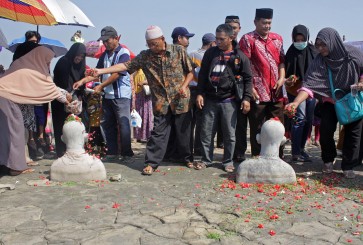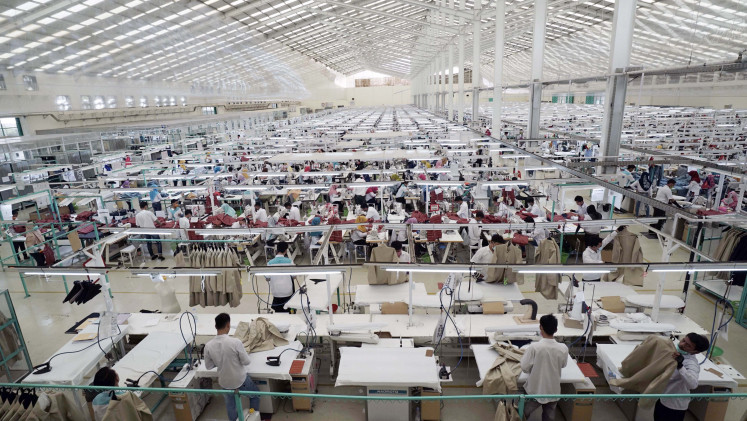Economic team lays out course for 2025 target
Last words: President Susilo Bambang Yudhoyono (center) chairs a Cabinet meeting on economic matters at the Bogor Presidential Palace on Thursday
Change text size
Gift Premium Articles
to Anyone

L
span class="caption">Last words: President Susilo Bambang Yudhoyono (center) chairs a Cabinet meeting on economic matters at the Bogor Presidential Palace on Thursday. Vice President Boediono (right) was also in attendance. Antara/Widodo S. Jusuf
The President’s economic team retreated to Bogor on Thursday to finalize a long-term economic master plan that envisioned Indonesia’s growth into one of the 10 largest economies in the world by 2025.
In his opening address at the meeting at the Bogor Presidential Palace, President Susilo Bambang Yudhoyono said he wanted the master plan to contain “concrete” action plans, including “clear agendas, targets and time lines, and clarity about who should do what”.
“We need definite plans. I’ve looked at documents from other governments and countries and they have such plans. There’s nothing wrong with drafting more definite plans apart from the usual strategic documents,” he said.
The President said the meeting in Bogor would focus on producing “the core of a master plan for economic growth” for the next 10 years and especially those due for implementation in the remaining four years of his second term.
Coordinating Economic Minister Hatta Rajasa said Indonesia was aiming to be among the world’s 10 largest economies by 2025, with projected GDP of up to US$4.7 trillion.
“Our vision for 2025 is that GDP will reach between $3.7 trillion and $4.7 trillion, with a per capita income of between $12,800 and $16,160. That way we will be among the world’s top 10 powers by 2025 and top six powers by 2050,” Hatta said at a press conference on the sidelines of the Cabinet meeting.
Referring to medium-term goals, Hatta said the government was aiming at economic growth of between 7 percent and 8 percent from 2013.
“Currently, Indonesia is among the world’s top 16 [economies]. In 2014, Indonesia’s GDP is predicted to reach between $1 trillion and $1.2 trillion, with a per capita income of $5,000.”
The International Monetary Fund and the World Bank ranked Indonesia’s GDP as the 18th largest at $540 billion in 2009. The country’s GDP in the first nine months of this year reached $524.8 billion, a 5.9 percent growth compared to the same period last year.
Thanks to resilient domestic demand amid the dwindling purchasing power of advanced economies, Indonesia’s economy emerged almost unscathed from the global economic crisis in 2008. Economic growth in the US and Japan stood at 2.5 percent and 0.9 percent, respectively, in the same period.
University of Indonesia economist Chatib Basri said the government’s target to increase GDP to $1.2 trillion by 2013 was not impossible given that the main hurdles to growth such as sluggish infrastructure had been addressed.
“The problem is we have no choice but to grow by between 7 and 8 percent. Our number one priority is to address land acquisition problems,” Chatib said.
The Cabinet, he said, should focus on solving this issue.
“There should be clear targets of how many kilometers of road must be built within a year, if not the minister should resign. The government should ensure its budget is spent on infrastructure projects.”
The government is forming a new regulation to set a benchmark price for the acquisition of land for infrastructure projects, which are often delayed because of the unrealistically high prices demanded by landowners.
The regulation would be included in a bill on land procurement for public facilities, currently being prepared by the government.
The government has allocated Rp 126 trillion from its 2011 budget for infrastructure development next year, far more than the Rp 108 trillion allocated in 2010.









